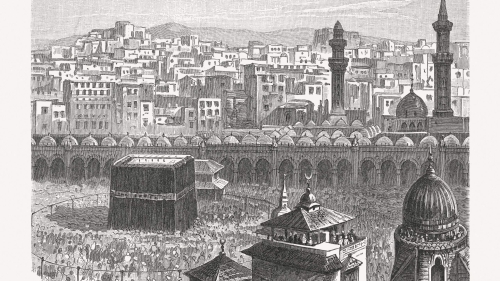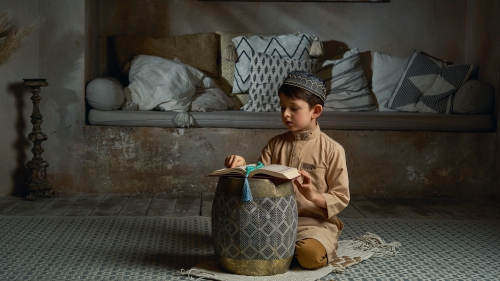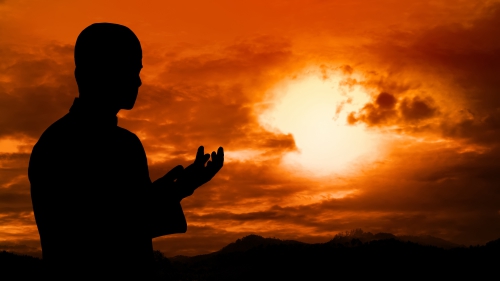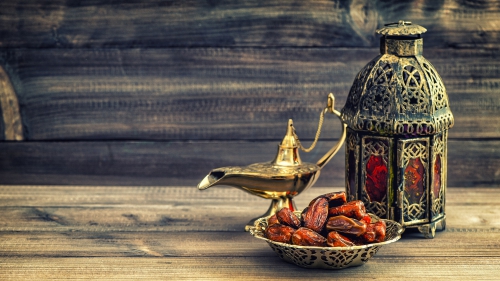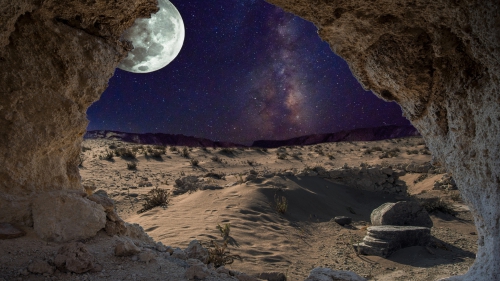Death is Created and Will Perish

Death is often described as life’s greatest mystery and the biggest fear of all. That is certainly true for those who fail to understand both life and death, and who live their lives wrongly and are eventually overtaken by death.
A sage has said that he has problems understanding a wretched person’s life and how at all he can be happy. As a bottomless pit, he spends his entire life chasing and trying to get hold of this fleeting world, while at the same time he is being chased by death. Whereas his catching of the world will never come to pass, it is just a matter of time before death snatches such a person and thus brings the whole chase to an abrupt end.
On that score, Prophet Muhammad (peace and blessings be upon him) described death as “the destroyer of pleasures” (Jami’ al-Tirmidhi). However, for a true believer, death is neither the greatest mystery nor the biggest fear in life. Death is just another life reality – albeit an extra complex, elusive, and impactful one – which a person must face and grapple with.
Death is an integral part of existence at the center of which stands man as Almighty Allah’s vicegerent on earth. For the fulfillment of a heavenly ontological purpose, it is as essential and meaningful as the phenomenon of life itself.
Death is life’s twin. They operate together, complementing one another. There can be no life without death in this transitory world, just as there can be no death without life. Death and life are two sides of the same coin. They make up the full existential reality of this earthly life cycle.
Allah Created Death
Almighty Allah reveals in the Qur’an that he had created death as well as life “in order to test which of you is best in deeds. And He is the Almighty, All-Forgiving” (al-Mulk, 2).
Death has been created and it came before life. That means – and Allah knows best - that death is not a negative state identifiable with the notion of utter nothingness or non-existence. It is a subtly positive state, or actuality, without which there could be no life as we know it. Existence without death would be unimaginable.
Death in its capacity as a life-less positive state, or reality, is mentioned as created before life because Allah as the Absolute Creator and Originator of existence created life ex nihilo, that is, out of nothing. The “nothing” here might connote the “death” mentioned before life in the preceding verse. It also might indicate the absolute nothingness or non-existence from which both death and life have been created.
At any rate, the concept of death is very important. It is crucial for understanding life in its totality. The same goes for the nothing-something dialectics, making the concepts of nothing and nothingness in philosophy, emptiness and empty space in quantum mechanics, and zero in mathematics, of equal significance. So important are they that without them life today will be hollow and virtually untenable.
Believers and Death
Every true believer - whose worldview is based on a synthesis of the revealed and conventional or acquired knowledge - knows that death is part of the heavenly plan for existence. Death is a created thing and the angels of death are but instruments of Allah’s Will.
Death is one of the most powerful and undeniable realities, as powerful and indisputable as life itself. Just like the latter, death is everywhere around us, perennially and clearly manifested as much in the smallest and least significant as in the grandest and most treasured.
Death signifies an inevitable state of transition from one plane, or dimension, of existence to another: from life as we know it in this world to another condition referred to in the Qur’an as the “life to come” or the “hereafter.” Death is a door through which everyone must exit this world and enter the hereafter.
Death signifies no end, but a change. Nor is it a termination or an expiry, but rather a movement and progress. It characterizes the most consequential aspects of life and its divine purpose. In a way, it is a microcosm of truth. Yet, it is truth itself.
That is why in Islam, whenever death as the mother of all adversities strikes, Muslims are invited to peacefully and with resignation declare: “Surely we belong to Allah and to Him we shall return” (al-Baqarah, 156). This proclamation encapsulates truth in much the same way as death, as a concept and sensory reality, does.
Death has nothing to do with the Creator and Lord of the universe and the life in it. Almighty Allah is its creator; death is but one of His creations. Death likewise has nothing to do with the eternity of the hereafter. It is only associable with this world because “all that lives on earth or in the heavens is bound to perish, but forever will abide the Sustainer’s Self (Face or Countenance) full of majesty and glory” (al-Rahman, 26-27).
The Death of Death
Like everything else, death is bound to die. It will not be resurrected to have a role in the hereafter. It seems that since for man this very truth will be hard to comprehend and fully come to terms with, the matter will be rendered convincible in a rather dramatic fashion. The spectacle of the death of death will be commensurate with the impact and authority it enjoyed while in this world.
The Prophet (peace and blessings be upon him) said: “Death would be brought on the Day of Resurrection in the form of a white-colored ram. Then it would be made to stand between the Paradise and Hell. It would be said to the inmates of Paradise: “Do you recognize this?” They would raise up their necks and look towards it and say: “Yes, it is death.” Then it would be said to the inmates of Hell-Fire: “Do you recognize this?” And they would raise up their necks and look and say: “Yes, it is death.” Then command would be given for slaughtering that and then it would be said: “O inmates of Paradise, there is an everlasting life for you and no death.” And then (addressing) to the inmates of the Hell-Fire, it would be said: “O inmates of Hell-Fire, there is an everlasting living for you and no death” (Sahih Muslim).
No Fear of Death
Furthermore, true believers not only believe in death, but also deal with and prepare for it as much as they do for life. They face it courageously and head-on. They see both life and death as necessary phases towards what they actually live and prepare themselves for. Both are tests in their own ways. Believers live to die, and die in order to live.
The Prophet (peace and blessings be upon him) said that the wisest people are those who “remember death often and have best prepared for it with good deeds” (Sunan Ibn Majah).
He also said that one of the main reasons for the Muslim Ummah’s decline will be the (excessive) love of this world and the hatred for death (Sunan Abi Dawud).
Thus, trying to deny and run away from the inevitable connotes neither wisdom nor courage. It is a serious aberration. That is so because wisdom is never to be connected with misguidance and confusion, nor courage with rampant recklessness, foolishness, and cowardice.
It follows that there is nothing unduly mysterious or scary about death. Like life, it is a gift from Allah that nevertheless requires a strength of character and soul to be appreciated.
Believers do not fear death, except for that amount of natural fear as is embedded in the soul and psyche of all humans. They do not attempt to run away from it either, for they know only too well that there is no escape from Allah except to Him.
What believers worry about is what and how much they have done, and whether that will be enough for securing Allah’s pleasure and His Paradise. Their lives unfold at the convergence of relative fear and unconditional hope.
If truth be told, so profound and momentous is the life of a believer that in spiritual terms he can transcend the created and imposed parameters of time and space, and with them the parameters of the created life and death. Eternity and infinity are the ultimate goals of a believer.
As a form of encouragement, Almighty Allah keeps emphasizing in the Qur’an that in doing so there will be no fear on believers, with reference to the forthcoming and “uncertain” stages of their extraordinary journey, the immediate one of which is death and everything it entails; nor shall they grieve, with reference to that which they leave behind trapped in the confines of time and space, and by extension, in the confines of the created life and death.
Who Fears Death?
Uncertain about and afraid of death are only such people as are ignorant about themselves and about life as an all-pervading miracle. Since the other half of existence is death, it is hardly surprising why those who in vain try to ignore and suppress death are never truly content or at peace.
Definitely, without death on-board, neither life can be fully optimized and enjoyed. No genuine existential victories can be associated with half-life.
Those backward people, as a result, will never stop inventing myriads of untruths and superstitions about dying and death, and of course about life as a whole. Believers should never fall prey to such follies. Believers’ God-given providence, dignity and worth are so exalted that they in no way can be reconcilable with the ideological nonsense of the modern nihilistic and hedonistic man.
Finally, life without death would be meaningless and incomplete. Moreover, it would be fake and unnatural. Only death can make life valuable and truly enjoyable. It can make it real.
A sage has said that he cannot understand how a bad person who knows will die soon can be happy, and how a good person who also knows will die soon can be unhappy.
Topics: Believers, Death, Life And Death, Life Hereafter (Akhirah), Paradise (Jannah), Soul (Nafs), Time Values: Contentment, Courage, Hope, Truthfulness, Wisdom
Views: 1364
Related Suggestions








